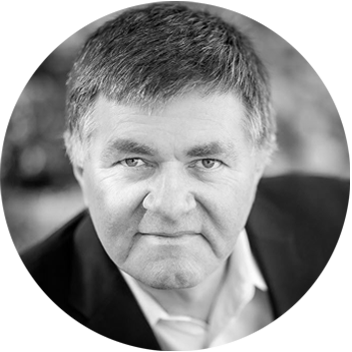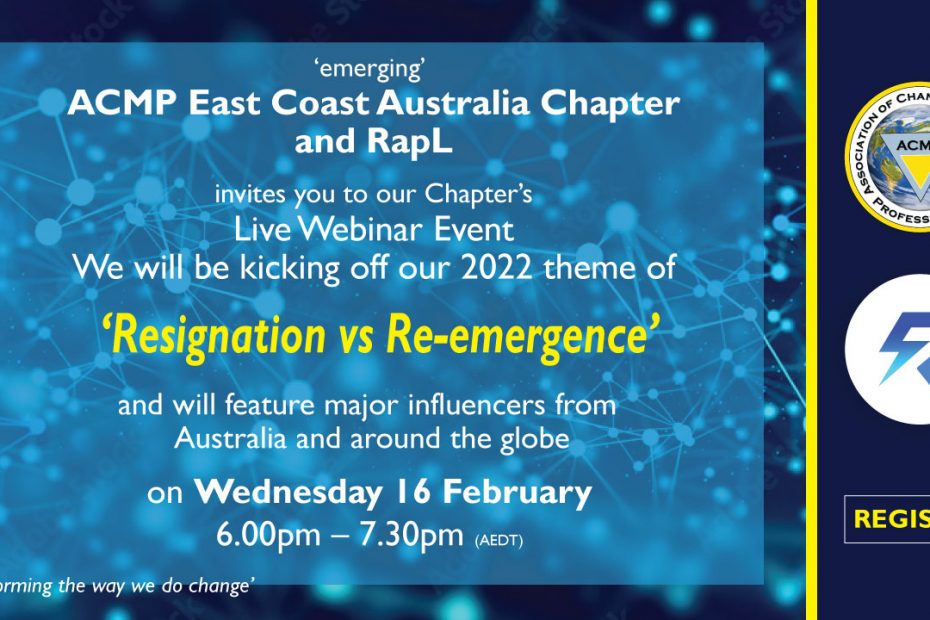Thank you for attending our recent Executive Advisory Group ‘roundtable’ discussion on the topic of
‘Resignation vs Re-emergence’
We hope you enjoyed it and gained some interesting insights from it.
As we mentioned, this is a series of three events which brings together thought leaders with unique skills and capabilities. Each event is based on the approach of Exploring, Expanding and Empowering you to understand the risks and issues ahead of us, and to provide you with insights and ideas on how to approach these issues.
The next roundtable discussions of this theme occur in July and November. We will be sending you invitations to these in due course and hope you will be able to join us.
If you cannot see your email invite for our events please check your junk/spam folder and mark “Not Spam”.
Want to know more?
The pressure to change has been building across organizations well before the impact of the global COVID-19 pandemic. Today we face a world of heightened connectivity, lower transactional costs, unprecedented advances in automation, and an increasing use of artificial intelligence and data analytics to drive performance and decision-making.
Results indicate that business disruption is in fact increasing, automation is undercutting mechanistic thinking, and the barriers to enter markets are evaporating. The workforce has very different career aspirations, expecting and demanding greater learning and career opportunities.
But whilst technology is converging, our organisations and job design remain ‘unconverged’ and 85% of people are still disengaged at work. Covid got people out of the building long enough for many to take stock of what was important to them now and to start ‘re-imagining’ what work needs to look like for them in the future.
Our focus is to transform the way we do change, and to embrace diverse skillsets, knowledge and experiences that are not traditionally associated with the current methodologies and frameworks we know today. Our emerging Chapter’s aim is to connect the dots in our new post-COVID world, and to embrace new ways of working, broaden our horizons, expand our knowledge, and create cultural environments where people are empowered, feel valued, have a sense of purpose, belonging and are encouraged to be the best that they can be because of strong leadership direction and responsibility.
The Executive Advisory Group (EAG) has been established and consists of thought leaders who will tackle the theme from multiple directions. The EAG brings together unique skills and capabilities to drive thought leadership and to provide a forum for discussing and sharing new ways of thinking to address the new challenges we all face such as:
What are the opportunities and dangers ahead for us in society, the future of work and the impacts on the workplace and work force in the next 5 to 10 years?
What are the levers we will need to consider using in our organizations to deal with this new future (appreciative enquiry, shifting the focus of power to the individual in the workplace, dangers of the reductionist model, the increasing importance of workplace ethos in the remote working environment)?
What role does Leadership alignment play?
How important is the role of the ‘Emotional Economy’ in the workplace, and what are the difficulties of sustaining this initiative in an age of remote working?
Are we applying new ways of thinking to address and normalize our response to these changes?
Is poor change management increasing mental health issues?
Is there a lack of alignment in the way we manage risk, products and services in our organizations?
Want to know more?
After seven years of implementing and teaching the ACMP Standard for Change Management, this is what I have learned and what may be next. There has been a significant increase in change management investment and organizational recognition of the profession since the ACMP Standard was introduced. The ability to communicate the value of our profession creates a positive opportunity to improve the support we get from our organization.
Change and project management can build effective Change Management models, frameworks, or methodologies, using the ACMP Standard as a playbook and inspiration. Through adherence to the ethics of our profession, we provide value to the organizations we support and enhance the professionalism of our industry. Senior executives should look to Change Management to reduce risk because it is part of our professional responsibility.
Finally, we will look at the Change Management Profession today and where it might head next.
Speaker

Roger Watson
Roger Watson, CCMP™, PMP®
